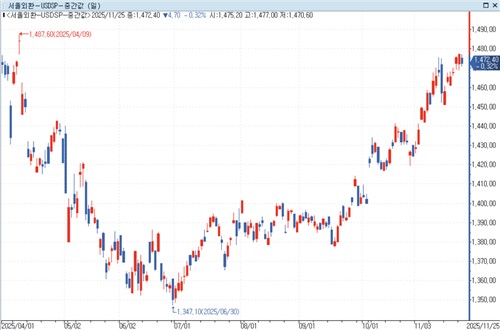(Seoul=Yonhap Infomax) Pil Joong Jeong – The recent surge in the USD/KRW exchange rate above 1,470 won has created a mixed outlook for South Korea’s pharmaceutical and biotech sector.
While the industry faces mounting cost pressures from higher import prices for raw materials, some companies are offsetting these challenges through technology licensing fees and export revenues. Major biotech firms such as Celltrion and Samsung Biologics, which generate a significant portion of their sales overseas, are expected to benefit from the strong dollar.
Rising Cost Burden for Pharmaceutical Firms—Seeking Opportunities in Exports and Licensing
According to Yonhap Infomax’s USD/KRW trading summary (screen number 2110) on the 26th, the exchange rate closed at 1,472.40 won per dollar, down 0.32% from the previous day. The rate has remained elevated since surpassing the 1,470-won mark intraday on the 12th.

The rising exchange rate has intensified concerns across the pharmaceutical sector, primarily due to increased costs for imported raw materials. Data from the Ministry of Food and Drug Safety shows that South Korea’s self-sufficiency rate for active pharmaceutical ingredients (APIs) was only 25.6% in 2023, making the industry highly dependent on imports. As a result, a stronger dollar directly translates into higher production costs.
The Korea Chamber of Commerce and Industry noted in January, when the USD/KRW rate spiked, that “purchases of APIs from China and India, which are relatively inexpensive and heavily relied upon, are conducted in dollars, so a rising exchange rate leads directly to higher costs.”
Companies conducting global clinical trials also face increased expenses, as these costs are paid in dollars. The scale of foreign currency-denominated debt further compounds the burden.
For example, Yuhan Corporation [000100] disclosed that a 10% depreciation in the won against foreign currencies would reduce its quarterly profit by approximately 6.49 billion won ($5.0 million). Similarly, Chong Kun Dang Pharmaceutical Corp. [185750] reported that a 10% change in the USD/KRW rate would impact its pre-tax profit by about 1.08 billion won ($830,000). Of Chong Kun Dang’s cumulative sales for the third quarter, totaling 1.27 trillion won ($980 million), 1.21 trillion won ($930 million) came from the domestic market, underscoring its reliance on local sales.
Some firms are seeking to offset these pressures by capitalizing on export opportunities and technology licensing. Last month, Yuhan Corporation announced it would receive $45 million in milestone payments for its non-small cell lung cancer drug Leclaza, following the commercialization of Janssen Biotech’s combination therapy “Amivantamab” in China. As these payments are received in dollars, the company stands to benefit from the strong exchange rate.
Daewoong Pharmaceutical Co. [069620] is also partially benefiting from the high exchange rate, as exports of its botulinum toxin product Nabota account for about 84% of its annual sales of 186.4 billion won ($144 million). Daewoong’s total sales last year reached 1.42 trillion won ($1.1 billion).
Major Biotech Firms Reap FX Gains from “King Dollar”
Large biotech companies are among the biggest beneficiaries of the strong dollar. For instance, Samsung Biologics Co. [207940] estimates that a 10% rise in the USD/KRW rate would boost its pre-tax profit by 103.8 billion won ($80 million) as of the third quarter. As a contract manufacturer for global pharmaceutical firms, Samsung Biologics receives payments in dollars, making a strong dollar advantageous. Its order backlog, based on minimum purchase volumes as of Q3, stood at $10.2 billion.
Celltrion [068270] also enjoys a high proportion of overseas sales, making it a beneficiary of the strong dollar. In the third quarter, Celltrion posted record consolidated sales of 1.03 trillion won ($800 million) and operating profit of 301 billion won ($230 million). Of its cumulative sales for the first three quarters, totaling 2.83 trillion won ($2.2 billion), overseas sales accounted for 2.54 trillion won ($1.97 billion).
Hyundai Motor Securities attributed Celltrion’s strong performance to “a recovery in cost of goods sold ratio to around 30% and foreign exchange gains from the rising exchange rate.”
The high exchange rate trend is expected to persist, with factors such as the Korea-US interest rate gap, increased domestic liquidity, and expanded investment in the US likely to keep the won weak for the time being. Should these forecasts materialize, the performance gap between companies could widen further.
Dal-mi Lee, a researcher at SangSangIn Securities, commented on Samsung Biologics’ outlook for next year: “2026 will be the first year when all profits are fully reflected, and with the full operation of Plant 4 and continued FX gains, the company is expected to maintain an annual operating margin in the 40% range.”
joongjp@yna.co.kr
(End)
Copyright © Yonhap Infomax Unauthorized reproduction and redistribution prohibited.

